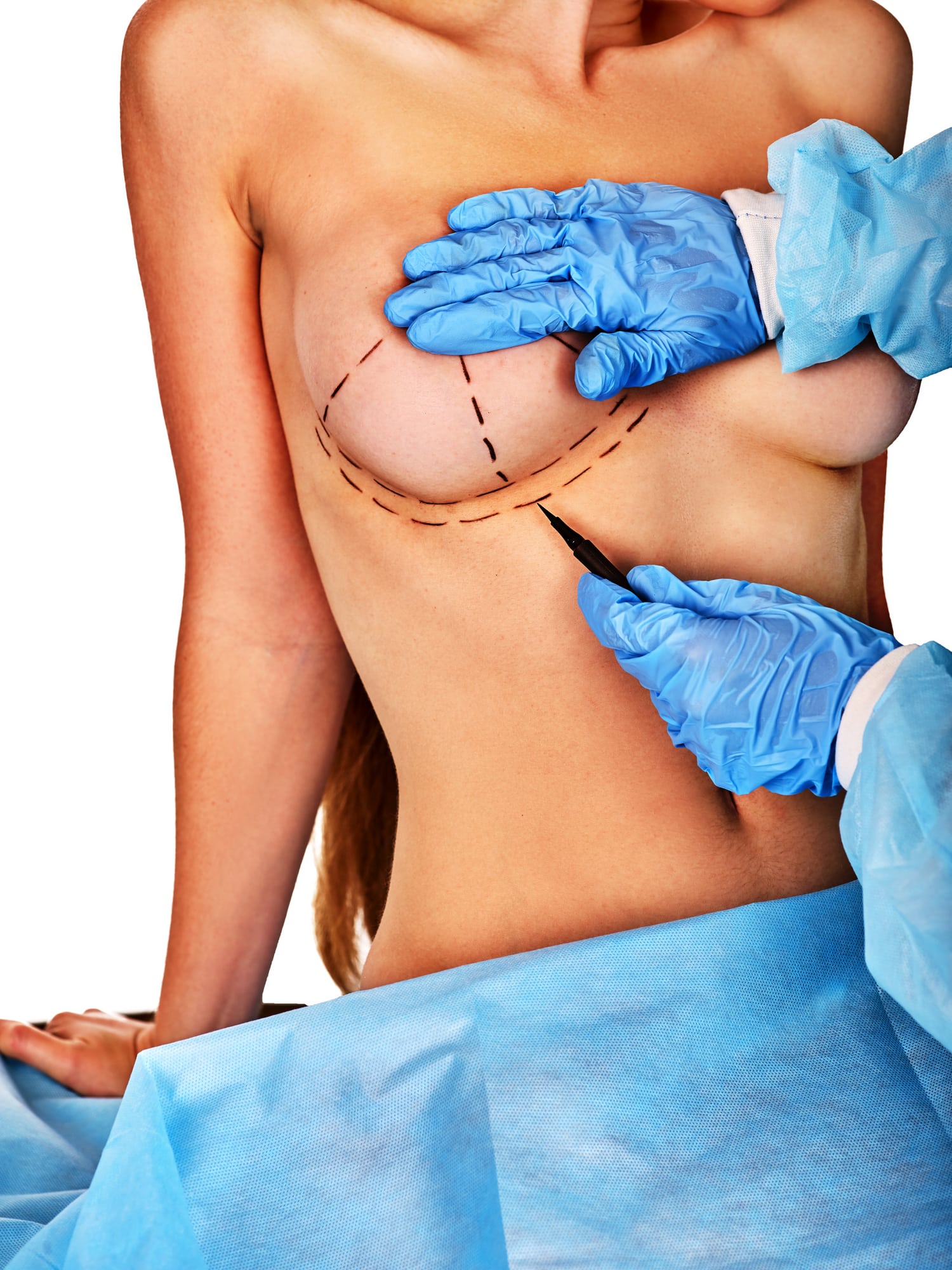Sussex Premier Health, Hastings: Important update for patients with upcoming appointments
Sussex Premier Health, Hastings: Important update for patients with upcoming appointments
Breast enlargement, also known as breast augmentation, is a cosmetic surgery procedure designed to enhance the size, shape, and overall appearance of your breasts. Whether you are looking to restore lost volume, improve symmetry, or achieve a fuller look, Sussex Premier Health offers expert breast enhancement procedures tailored to your needs.
Our highly experienced consultants provide a patient-centred approach, ensuring personalised care from your initial consultation through to recovery.

Breast enlargement surgery, also known as breast augmentation, is a procedure that increases the size and enhances the shape of the breasts using implants. It is one of the most commonly performed cosmetic surgeries in the UK, and at Sussex Premier Health, it is carried out by experienced consultants who take the time to understand individual goals and concerns.
The procedure involves inserting implants—either under the breast tissue or beneath the chest muscles—to achieve the desired size, volume, or symmetry. It can also be used to correct breast asymmetry, restore fullness lost due to pregnancy or weight changes, or support reconstruction following surgery or injury.
People choose breast augmentation for a range of personal, cosmetic, or medical reasons. You may be considering surgery because:
The breasts feel too small or out of proportion with the rest of the body
One breast is noticeably different in size or shape
The breasts have changed due to pregnancy, weight loss, or ageing
Confidence or body image has been affected by breast appearance
There is a need for reconstruction following breast cancer surgery, injury or a congenital condition such as tuberous breasts
In some cases, a breast uplift (mastopexy) may be more suitable, particularly if drooping is the main concern. This procedure can lift and reshape the breasts without necessarily increasing their size. Your consultant will explain the best approach during your consultation.
At your first consultation, the surgeon will discuss the available implant options in detail and help guide the decision based on your body shape, lifestyle, and desired results. The main types of breast implants are:
Silicone implants
These are filled with a gel-like substance that closely mimics the feel of natural breast tissue. Silicone implants are the most popular choice in the UK because they tend to feel softer and more natural.
Saline implants
These are filled with sterile salt water after being placed inside the breast. If a rupture occurs, the body naturally absorbs the solution. However, they tend to feel firmer and slightly less natural than silicone.
If you decide to return to a natural appearance in the future, we can remove your implants, regardless of type.
Breast enlargement is a personal choice and a significant decision. It’s important to take the time to consider your reasons and to fully understand what the procedure involves—both now and in the future. Before proceeding, it’s essential to:
Research the different techniques and implant types
Speak with a medical professional to explore your motivations and expectations
Understand the full cost of the procedure, including aftercare and potential future surgeries
All surgical procedures carry risks, so choosing a properly trained and experienced surgeon is vital. At Sussex Premier Health, our consultants are registered with the General Medical Council (GMC), and many are listed on the GMC’s Specialist Register.
To ensure peace of mind, you may also check if the surgeon is listed with:
The British Association of Aesthetic Plastic Surgeons (BAAPS)
The British Association of Plastic, Reconstructive and Aesthetic Surgeons (BAPRAS)
The Royal College of Surgeons – Certified Cosmetic Surgeons Register
When researching a surgeon, consider asking:
How many breast enlargement procedures they have performed
Their patient satisfaction and complication rates
What aftercare and follow-up support is provided
You’ll be able to meet one of our experienced cosmetic surgeons in a private consultation room. There will be an opportunity to discuss:
• The type of breast augmentation procedure that you’d like to have and the different implant options that are available to you
• Your medical history
• Any other surgery you might want to consider as an alternative to breast augmentation, such as breast uplift, as this might be a better option for you
• The kind of tests you’ll need to have before the procedure
• What’s involved in having the surgery, including the anaesthetic, and any risks and complications
• Any other questions or concerns you may have about your surgery and what happens afterwards
Your surgeon will also examine your breasts and may ask to take confidential photos for your medical records.
You won’t be put under pressure to make any decisions straight away. Your consultant will explain that even if you feel sure about what you’d like to do next, there’s at least a two week cooling-off period before the operation in case you change your mind.
Before you go ahead with the operation, you may need to have a pre-operative assessment.

When you arrive for your operation, our ward staff will show you to your own private room. Your private room will have an en-suite bathroom and TV and Wi-Fi facilities.
Once you’re ready, our nurses will help you prepare for your operation. You will see your consultant, and you will have a chance to meet your anaesthetist and surgical team.
In order for you to undergo the procedure, you’ll have a general anaesthetic, so you’ll be asleep for the duration of the operation. This usually takes between one and two hours. Your surgeon will make incisions in your breasts and insert your new implants.

After a breast enlargement surgery, most patients can return home the same day or the following morning. You will receive detailed aftercare instructions to maximise your results and speed up recovery. While recovery times vary, you can typically expect:

It’s natural to worry about scarring after a breast augmentation. Some scars are inevitable but are typically well-hidden and fade significantly over time. The location of your incision will often play a big part in how you scar. For instance:

Breast enlargement is a highly personal decision. We can offer guidance and expert advice, but at the end of the day, it has to be your decision. Ideal candidates for breast augmentation include:
Breast enhancement surgery is still surgery, so it’s not a decision to make lightly. Before getting breast augmentation, you should carefully consider the procedure to be sure it’s the right decision for you. Here’s what to think about:
As a trusted private healthcare provider in Sussex, we stand out for our commitment to personalised patient care and superior medical expertise. Choose us for:
Your surgery will be performed by your consultant surgeon.
Breast cancer screening is performed using mammography, which uses X-ray imaging to detect cancers that are too small to feel. After breast enlargement, the X-rays can’t pass through the implant and so some of your breast tissue won’t be visible on the images making them less accurate. You’ll need to tell your mammography service that you’ve had a breast enlargement so they can take special views and possibly screen you at a different centre. Mammograms are safe and don’t cause implants to rupture.
A rupture is when the implant splits or a hole appears in the shell. When a saline implant ruptures, the saline liquid inside will be harmlessly absorbed by your body over a few days, making the breast appear deflated. This will be easy to notice and the ruptured implant should be removed and may be replaced with a new one at the same time.
When a silicone implant ruptures, the gel may stay within the implant shell. If this happens, you may not notice unless you have a scan. However, some people experience pain, thickening, changes in shape of their breast and lumps (siliconomas) which are only detectable on scans. In these cases, you should contact your surgeon or GP and the implant will need to be removed.
You should choose a surgeon who has the correct training and experience to perform breast enlargement. As a minimum, cosmetic surgeons need to be registered with and licensed by the General Medical Council (GMC) as a doctor and many will also be on the GMC’s specialist register, although doctors can sometimes practice in a specialty not shown on their Specialist Register entry. You can check this register to see a doctor’s specialties (and sub-specialties) that they are qualified in and the date they joined the specialist register in each specialty.
You can find a cosmetic surgeon on a specialist registers provided by:
When researching a surgeon, you may want to find out:
Breast implants don’t last forever and many women find they need further surgery after about 10 years. This can be because of problems with the implant itself or to maintain their shape. Manufacturers state that they should last between 10 to 15 years. If you don’t experience any problems, your surgeon may recommend you leave them in place for longer.
When a saline implant ruptures, the saline fluid inside is quickly (over a few days) released into the body and harmlessly excreted.
If the implant is covered with just a thin layer of tissue, this can cause rippling. The layer of tissue sticks to the implant surface and it’s difficult to treat.
Your stitches will be removed or dissolved around one or two weeks after your operation. You should be able to return to normal activities at around six weeks with your breasts looking and feeling more natural from six to 12 weeks after your operation.
Silicone implants are less likely to rupture than saline implants. Manufacturers state that implants should last between 10 and 15 years, though many women need further surgery after about 10 years. This can be due to implant rupture or changes in the shape of their breast around the implant.
Speak to a member of our team